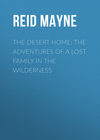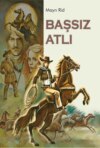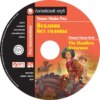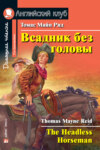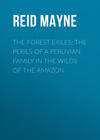Kitabı oku: «The Desert Home: The Adventures of a Lost Family in the Wilderness», sayfa 13
Chapter Twenty Seven.
The Snow-Line
“In three days the cart was finished. We had no difficulty in constructing one, as the principal part – that is, the wheels – was already made. We had two pair of them, of course, in our old wagon; and the larger ones, which happened to be in very good order, served our purpose exactly. Cudjo soon attached a body and shafts to them, and Pompo’s harness was put into thorough repair.
“We had not long to wait for a fine day. Every day was fine in the clear, pure climate of our valley; so that, as soon as the cart was ready, we had a day to our liking.
“We set out shortly after sunrise, with our hearts full of anticipated pleasure. Of course we all went – Mary, the children, Cudjo, Pompo, dogs, and all. The house was again left to take care of itself. Mary and the two little ones rode in the cart, upon a soft seat made of palmetto leaves and Spanish moss. Pompo, who appeared to partake of the general happiness, whisked the vehicle along as if there had been nobody in it, and he was only drawing it for his own amusement. Cudjo cracked his great wagon-whip, and every now and then uttered a loud ‘wo-ha;’ while Castor and Pollux galloped gaily from side to side, running their noses into every bush that grew near the path.
“We soon made our way through the valley, and climbed up to the plain. We looked once more upon the Desert that stretched away on all sides; but its dreary aspect no longer filled us with fear. We did not regard it now, and the sight inspired us with feelings of curiosity and novelty rather than of terror. Away to the southward the sun was glancing upon the broad expanse of white sand; and several tall objects, like vast dun-coloured towers, were moving over the plain. They were whirlwinds carrying the dust upward to the blue sky, and spinning it from point to point. Sometimes one glided away alone, until it was lost on the distant horizon. Here two of them were moving in the same direction, keeping a regular distance from each other, and seemingly running a race. There several came together; and, after a short gusty contest, the whole set would break up into shapeless masses of yellowish clouds, and then float onward with the wind, and downward to the earth again. It was an interesting sight to view those huge pillars towering up to the heavens, and whirling like unearthly objects over the wide plain. It was indeed an interesting sight, and we remained for many minutes observing their motions.
“At length we turned our faces toward the mountain, and continued our journey along the edge of the cliffs. The high peak glistened before us, and the sun’s rays falling upon it caused it to appear of a beautiful colour – a mixture of gold and red, as though a shower of roses had fallen upon the snow! We noticed that there was now more snow upon the mountain than when we had first seen it, and that it came farther down its sides. This attracted the attention of all of us; and Frank at once called for an explanation, which his mother volunteered to give, for she very well understood the phenomenon.
“‘In the first place,’ said she, ‘as you ascend upwards in the atmosphere, it becomes thinner and colder. Beyond a certain point it is so cold, that neither men nor any other animals can exist. This can be proved in several ways; and the experience of those who have climbed mountains, only three miles high, confirms it. Some of these adventurous men have been nearly frozen to death. This is a fact, then, in regard to the atmosphere over all parts of the earth; but we may also observe, that under the Equator you may go higher without reaching this extreme cold, than in the countries which lie nearer to the Poles. Another fact, which you will easily believe, is, that in summer you can climb higher before you reach the cold region than in winter. Bear these facts in mind. Now, then, if it be so cold at a certain height that men would be frozen to death, of course at that height snow will not melt. What is the natural inference? Why – that mountains whose tops pierce up into this cold region will most certainly be covered with perpetual snow. It is not likely that anything but snow ever falls upon their summits, – for when it rains upon the plains around them, it is snowing upon the high peaks above. Indeed, it is probable that most of the rain which descends upon the earth has been crystals of snow when it commenced its descent; and, afterwards melting in the lower and warmer regions of the atmosphere, takes the shape of water globules, and thus falls to the ground. These globules, no doubt, are very small when they first emerge from the snow region; but, as they pass slowly downward through clouds of vapour, they gather together and attract others (by a law which I have not time to explain); and, descending faster and faster, at length plash down to the earth in large drops. Whenever it rains, then, at any particular place, you may be almost certain that it is snowing at the same time over that place – only at a point in the atmosphere far above it. I have been convinced of this fact, by observing that immediately after every occasion when it has rained in the valley, there appeared a greater quantity of snow upon the mountain. Had the mountain not been there, this snow would have continued on, and become rain, like that which fell upon the plains, and into the valley.’
“‘Then, mamma,’ interrupted Frank, ‘this mountain must be of great height, since the snow lies upon it all the year.’
“‘Does that follow?’
“‘I think so. You said the snow did not melt because it was cold high up.’
“‘But suppose you were in a country near the North Pole, where snow lies all the year at the very sea-side, and consequently at the sea-level, would it then prove a mountain to be very high?’
“‘Oh! I see – I see now. The perpetual snow upon a mountain only shows it to be of great height when the mountain happens to be in warm latitudes.’
“‘Precisely so. In very warm countries, such as those within the tropics, when you see the snow-cap upon a mountain, you may infer that it is a very high one – at least over two miles in height; and when there is much snow upon it – that is, when the snow reaches far down its sides – it proves the mountain to be still higher, – three miles or more above the level of the ocean.’
“‘Our mountain, then, must be a high one, since it is in a warm latitude, and snow lies all the year upon it.’
“‘It is a high one, comparatively speaking; but you will remember, when we first saw it, there was only a small patch of snow upon its top, and probably in very hot summers that disappears altogether; so that it is not so high as many others upon this continent. Taking our latitude into calculation, and the quantity of snow which lies upon this mountain, I should say it was about 14,000 feet.’
“‘Oh! so much as that! It does not seem half so high. I have seen mountains that appeared to me to be quite as high as it, and yet it was said they did not measure the half of 14,000 feet.’
“‘That arises from the fact that you are not viewing this one from the sea-level, as you did them. The plain upon which it stands, and from which we view it, is of itself elevated nearly half as much. You must remember that we are upon one of the high tables of the American continent.’
“Here, for a minute or so, the conversation stopped; and we travelled on in silence, all of us with our eyes fixed on the white and roseate peak that glittered before us, leading our eyes far up into the heavens.
“Frank again resumed the discourse, which had been broken off by our admiration of this beautiful object.
“‘Is it not curious,’ said he, ‘that the snow should lie so regularly, coming down on all sides to the same height, and ending just like the cape of a coat or the hem of a nightcap? It seems to be a straight line all around the mountain.’
“‘That line,’ rejoined his mother, ‘is, as you say, a curious phenomenon, and caused by the laws of heat and cold, which we have just been explaining. It is called the “snow-line,” and a good deal of speculation has arisen among cosmographers about the elevation of this line. Of course, on mountains within the tropics this line will be at a great height above the level of the sea. As you advance northward or southward to the Poles, it will be found lower and lower, until within the frigid zones it may be said to cease altogether – for there, as we have said, snow covers the whole earth, and there can be no “snow-line.”
“‘From this, one would suppose that an exact scale might be formed, giving the elevation of the snow-line for all latitudes. But that could not be done. Observation has shown that it not only differs on mountains that lie in the same latitude, but that on the same mountain it is often higher on one side than the other – particularly on those of great extent, as the Himmalehs of India. This is all quite natural, and easily accounted for. The position of mountains to one another, and their proximity or great distance from the sea, will give them a colder or warmer atmosphere, independent of latitude. Moreover, the same mountain may have a warmer climate on one side than the other; and of course the snow-line will be higher on that side which is the warmer, in consequence of the greater melting of the snow. This line, too, varies in summer and winter for a like reason – as we see here upon our own mountain, where it has already descended several feet since the weather became colder. This, you will acknowledge, is all very natural; and you will see, too, that Nature, although apparently capricious in many of her operations, acts most regularly in this one, as perhaps in all others.’
“‘But, mamma,’ inquired Harry, ‘can we not get to the top of the mountain? I should like to have some snow to make snow-balls, and pelt Frank with them.’
“‘It would be a very difficult task, Master Hal; and more than either you or I could get through with. I think Frank will escape being snow-balled this time.’
“‘But people have climbed to the top of the Himmaleh mountains; and they are far higher than this, I am sure.’
“‘Never,’ interrupted Frank; ‘no one has ever climbed the Himmalehs. Have they, mamma?’
“‘No mortal has ever been so high as the summits of those great mountains, which are more than five miles above the level of the ocean. Even could they be climbed, it is not likely that any animal could live at their top. These inaccessible things seem to have been designed by the Creator to afford us objects for sublime contemplation – objects far above the reach of mortal man, and that can never be rendered common by his contact. Do they not seem so?’
“We had now reached the foot of the mountain, and halting near the entrance of the ravine, we loosed Pompo from his cart, and rested ourselves on the banks of the little stream. After a while we commenced ascending up into the defile in search of the piñons. As we advanced, Mary pointed out the trees which she had noticed on a former occasion. They appeared of a light green colour, much lighter than others that grew near them. We made towards one which stood apart, and was most accessible to us. This we hoped might prove to be the bread-pine tree; and we approached it with feelings of anxiety and expectation.
“In a short time we were under its branches; and if we had had no other test than what we saw there, combined with the delicious fragrance of the tree, we could have told that it could be no other than the piñon. The ground was covered with cones, each of them about an inch and a half in length; but on examining them, we found them all broken open and the seed extracted. Some animal had been there before us, and relished their contents – thus affording a proof that they were good to eat. There were still many of the cones hanging on the tree; and it was not long until we had split some of them open and tasted their ripe seeds.
“‘It is it!’ cried my wife, clapping her hands with delight. ‘It is the nut-pine! This will serve for bread until we can grow our wheat and corn. Come, let us gather them,’ added she, pointing to a large grove of the same trees that grew at a short distance; and we all hurried to the grove, and commenced shaking down the cones and gathering them into heaps.
“We had soon collected as many as we wanted, and in the evening we returned to the valley, with our little cart half-full of pine-nuts. On reaching home, some of them were parched and pounded into a sort of coarse meal; and that night, for the first time during many weeks, we had cakes to our supper.
Chapter Twenty Eight.
The Menagerie, Aviary, and Botanic Garden
“We were busy of course every day, as we had plenty of work to do. We laid a floor in our cabin, and fenced a couple of fields – one to plant our corn in, and the other to keep Pompo from straying off into the woods, and meeting with some animal that might feel inclined to devour him. We also succeeded in killing several red-deer and a couple of elk, which we stored up for our winter provision. We did not find the black-tails very palatable, and most of their flesh went to feed Castor and Pollux.
“Cudjo was the busiest of all of us. He made several household utensils which proved of great service to us. He also constructed for himself a wooden plough, which would serve every purpose – as there was a considerable portion of the ground that was without turf, and could be easily turned. This part had been covered with beautiful flowers, such as sunflowers, red and orange-coloured poppies, and asclepias. It was almost a pity to plough them up.
“With an eye to the future scarcity of our ammunition, we had begun to practise hunting with a weapon which would answer all our purposes almost as well as the rifle – still keeping the latter of course for great occasions. We had found some of the bois d’arc, or “Osage orange,” as it is called, growing in the valley. This is the famous bow-wood of the Indians; and taking a hint from these children of Nature, we made three bows, stringing them – as the Indians do – with the sinews of the deer. For arrows, we had the straight cane-reeds; and Cudjo made us a set of barbs out of iron spikes that we had taken from the wagon. With daily practising at a mark, before the winter was over, we were all three able to use our new weapons to some purpose; and Harry, to his mother’s great delight, could bring down a squirrel from the top of the highest tree in the valley. As a marksman, both with the bow and rifle, he was quite superior to Frank, who, instead of feeling jealous, seemed rather to be proud of the skill of his brother. Harry, during all the winter, kept our table loaded with partridges, squirrels – of which there were several species – hares, and wild turkeys; the last of which, being much finer than tame ones, of course we were all very fond of.
“My wife, too, added largely to the delicacies of our table. During the last days of autumn, she made several botanical excursions – of course, all of us accompanying her by way of guard – and in each of these some useful production was discovered. We found several species of wild fruits – currants, cherries, and a small fruit known as the “serviceberry,” which grew in great profusion. All these fruits were gathered in quantity, and made into preserves. We obtained roots as well – one of which was the pomme-blanche, or Indian turnip; but the most interesting of all was the wild potato, which we dug up – for, in fact, it is only upon the table-lands of America where that plant is indigenous. We should not have recognised it as an old acquaintance, but for the botanical knowledge of my wife. Its roots were not larger than wren’s eggs, and we could find so few of them that, in its wild state, we saw it would be of no use to us as an article of food. Mary, however, had hopes, that by cultivation, we might produce larger ones; so we collected all the tubers we could fall in with, and kept them for seed.
“Out of the pods of the honey-locust, we brewed a very agreeable sort of beer; but we were able to extract a still more generous beverage from the wild or fox-grapes that grew in all parts of the valley. While travelling through France, I had learnt how wine was made; and our vintage succeeded to perfection. On the winter nights, as we sat around our cheerful log-fire, Mary was accustomed to deal out to us a measure a-piece of the exhilarating drink. It was only, however, after a hard day’s work or hunting, that we were allowed to draw upon this precious store.
“About this time, a new idea entered into my mind, which I communicated to the others, and with which they all fully agreed. It was this: – To capture as many of the wild animals as we could, and endeavour to domesticate them to our uses. I was prompted to this purpose by various considerations. First, because I saw, although there were several kinds of deer in the valley, there were but few of each kind; and it was not likely that for many years they had been upon the increase. Nature had so disposed it, that these creatures had been regularly thinned off every year by the numerous beasts of prey that prowled through the valley. Now, an additional enemy was added to the number of their destroyers; and I foresaw that, unless some precaution should be taken, the deer would soon become so scarce and wild, that we should find it difficult to obtain enough for our uses. Could we only kill off the fierce beasts – such as panthers, and wolves, and wolverenes – that preyed upon them, then the whole valley would become our deer-park, and the deer would soon increase to any number we wanted. This, however, we could not do; and, in fact, the beasts of prey were as likely to master us as we them – for none of us were safe in venturing into the thick woods alone; and whenever the boys made a short excursion from the glade, their mother was always in a state of anxiety until they returned. In fact, every hunt we made was attended with considerable danger, as we always fell in with the tracks of wolves, panthers, and even bears; and we frequently saw these animals skulking through the underwood. We knew that in time our powder must run out, and then our rifles would be useless to us. Our bows and arrows would then avail us but little against such thick-hided monsters as these. We only hoped that when we became better acquainted with the habits of these carnivorous creatures, we should be enabled to destroy them in traps, and thus thin them off at our leisure, and without wasting our ammunition. This, of course, would constitute a branch of our employment; and, besides being a work of utility, would furnish us with an excitement not the less agreeable because it was hazardous. Could we, therefore, collect a few of the more useful animals into an enclosed park, they would soon propagate and increase; and then the trouble as well as danger which we experienced in hunting them would be at an end. We knew that our maize-corn, yielding two crops in the year, would enable us to supply them abundantly with food.
“There was still another consideration which had its weight in these plans. I was very fond of the study of natural history – particularly that branch of it relating to quadrupeds – and I foresaw the pleasure of observing the habits of these wild creatures. We should not, therefore, confine ourselves to making ‘pets’ of those animals that might merely serve us for food. We should embrace in our collection all that we could subject to our rule, whether gentle or fierce. In fact, it was our intention to establish a regular ‘menagerie of the Desert.’
“The main object of our industry and prospective wealth – that is, the collection of the beaver fur – would not in any way interfere with these plans. The beavers, in short, would give as very little trouble – as the drying and preserving the skins of those we should trap would only occupy us a small portion of the year.
“Harry entered with more spirit into my designs than any of the others; for Harry, like myself, was fond of quadrupeds. Frank, on the other hand, was a great bird-catcher; and recommended that we should include birds in our menagerie. To this, of course, we assented freely. Mary had her own designs already shaped out; and these were, to gather all the plants and trees that might be either curious or useful, and to observe what effect cultivation would produce upon them – in short, it was her wish to form a complete ‘botanical garden.’
“To each, then, was given a separate department. Harry and I were designated ‘beast-tamers;’ Frank the ‘bird-tamer;’ while Mary was appropriately styled the ‘tree-tamer.’ To Cudjo was assigned a very important share of the labour. He was to enclose the park for our deer, as well as the grounds for the botanic garden. He was also to make our traps and cages – all of which things Cudjo knew how to do, and how to do them well. Of course, we were to assist him, as well as each other, in carrying out our designs.
“Thus, our plans for the future were interesting to all of us. In our various pursuits, we should be enabled to employ all our idle time. We had no books, either to amuse or instruct us; but we knew that we should derive both instruction and amusement from the study of the greatest of all books —the book of Nature.”
